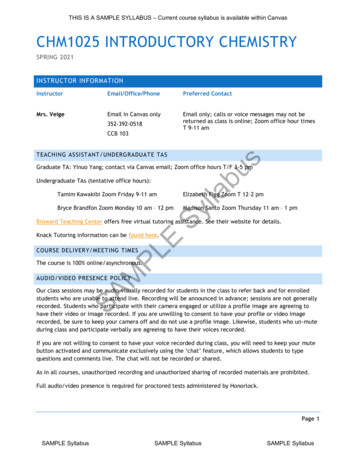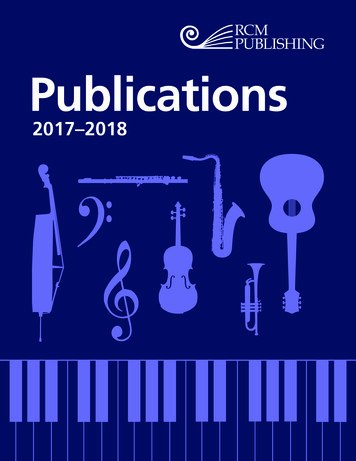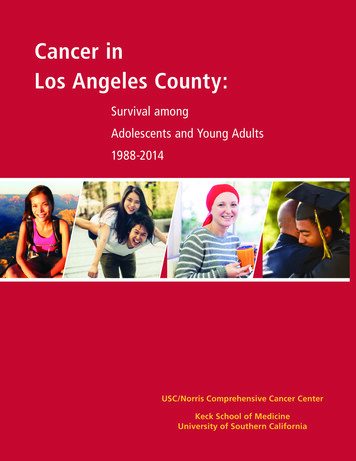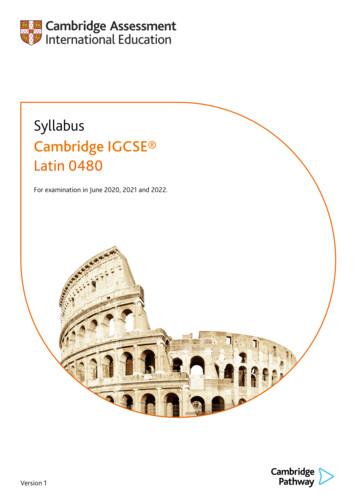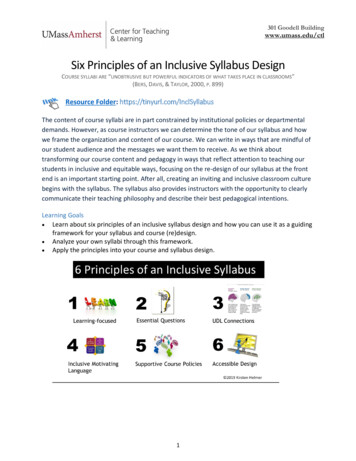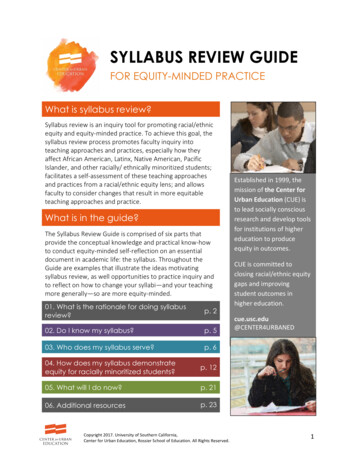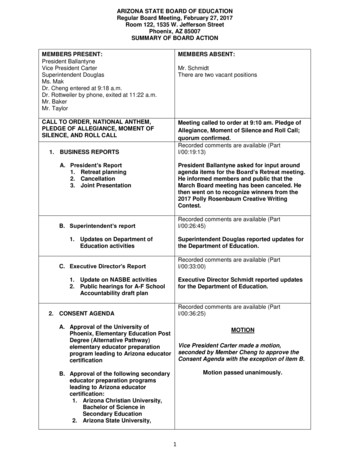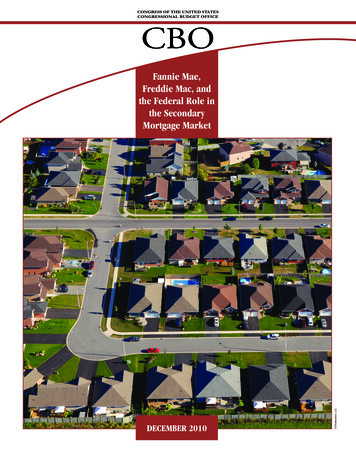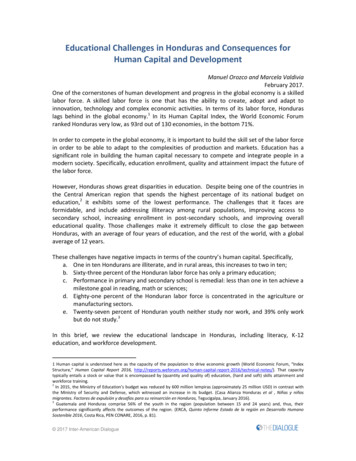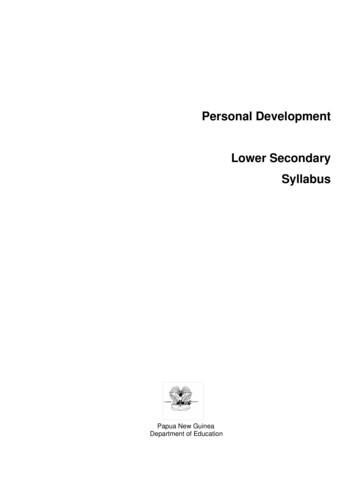
Transcription
Personal DevelopmentLower SecondarySyllabusPapua New GuineaDepartment of Education
Personal DevelopmentIssued free to schools by the Department of EducationPublished in 2006 by the Department of Education, Papua New Guinea. Copyright 2006, Department of Education, Papua New Guinea.All rights reserved. No part of this publication may be reproduced, stored in aretrieval system or transmitted by any form or by any means electronic,mechanical, photocopying, recording or otherwise without the prior writtenpermission of the publisher.ISBN 9980-935-44-8AcknowledgementsThe Lower Secondary Personal Development Syllabus was written, editedand formatted by the Curriculum Development Division of the Department ofEducation. The development of the syllabus was coordinated by RodneySumale.Teachers, inspectors, tertiary educators, community members,representatives from non-government organisations and the PersonalDevelopment Subject Advisory Committee have developed this syllabusthrough meetings, workshops and consultations.This document was developed with the support of the AustralianGovernment through the Curriculum Reform Implementation Project.ii
Lower Secondary SyllabusContentsSecretary’s message. ivIntroduction . 1Rationale . 3Curriculum principles. 4Content overview . 11Units . 13Grade 9 units. 19Grade 10 units. 36Assessment, examination and certification . 54iii
Personal DevelopmentSecretary’s messagePersonal Development is a new subject at Lower Secondary and comprisestwo main components; Personal Development and Sports and Fitness. ThePersonal Development component consists of elements of subjects such asPhysical Education, Religious Education, Health, Guidance and PersonalDevelopment.Personal Development is a required subject for all Grade 9 and 10 students.This syllabus is to be used by teachers to teach Lower Secondary studentsthroughout Papua New Guinea. It builds upon concepts, skills and attitudesfrom Upper Primary and links to concepts, skills and attitudes in UpperSecondary. It provides a sound foundation for further learning.Personal Development focuses on enabling all students to develop positiveself-concepts and their capacity to establish and maintain safe, healthy andrewarding lives to promote and improve their lifestyles. It takes into accounthow Papua New Guinea looks at, and takes pride in our culture and valuesystems and encourages students to act morally and ethically. PersonalDevelopment challenges all students to maximize their individual talents, toappreciate the spiritual part of their lives and to take an effective andresponsible part in society.The Personal Development syllabus contributes to integral humandevelopment as it is based on the students’ physical environments, societiesand cultures. It links to the National Education Plan’s vision which is thatsecondary education enables students to achieve their individual potential tolead productive lives as members of the local, national and internationalcommunity, by undertaking broad range of subjects and work relatedactivities that can be used in everyday life.The syllabus addresses a wide range of personal, social and communityhealth issues such as reproductive health, growth in population, nutrition,physical activity, safety, HIV/ AIDS, drugs and alcohol, moral ethics andbehaviour, freedom and rights of the individual, and peer pressure. Itencourages students to confront personal issues and deal with themresponsibly.Cooperation and consultation among stakeholders such as school, parentsand community will ensure that issues are addressed within the parametersof our communities and society. All students should be encouraged toparticipate in all activities to enable them to reach their full potential in allaspects of their lives and to realize the importance of being respected andresponsible citizens.I commend and approve this syllabus as the official curriculum for PersonalDevelopment to be used in all schools with Grade 9 and 10 studentsthroughout Papua New Guinea.DR. JOSEPH PAGELIOSecretary for Educationiv
Lower Secondary SyllabusIntroductionThe National Curriculum Statement states that education in Papua NewGuinea is outcomes based. All Lower Secondary syllabuses use anoutcomes approach. The Personal Development syllabus has beendesigned using learning outcomes which identify the knowledge, skills,attitudes and values that all students achieve and demonstrate by the end ofGrade 10. It selects the essential knowledge and skills from syllabusesteachers have used in the past, and incorporates these with new conceptsand ideas in Personal Development to ensure that the syllabus providesrelevant skills and knowledge for students. Personal Development is part ofthe national curriculum learning area Culture and Community and builds onthe knowledge and skills students have learnt in Primary ersonalDevelopmentUnitsRelationshipsMovement andphysical activityOur culture, lifestyleand valuesHealth of individualsand populationsLiving and workingtogetherRelationships andcharacterdevelopmentHealthy livingSpiritualitySport and FitnessWho am I?Fitness and MeHealthThe PNG WayReproductive andSexual HealthFamily andRelationshipsUniversal ValuesAssessment is an important component of teaching for learning and isintegrated into the teaching and learning activities of Personal Development.Continuous assessment in Personal Development provides feedback tostudents and the teacher on students' progress towards achievement of thelearning outcomes. It helps students improve their standards of achievementby knowing what they need to do well and where they need to improve. InPersonal Development, teachers gather evidence from students’ work duringthe course of the term and use those continuous assessments to improvetheir teaching and students’ learning.Personal Development is an important subject as it deals with the individualand their interaction with others. The individual is the centre of learning interms of personal health, fitness, how the individual relates to others andtheir community, development of positive values and attitudes and makingchoices and decisions on social, political, economical, physical and spiritualissues that affect them.1
Personal DevelopmentThe syllabus is flexible as the sports and fitness framework, which is donealongside each personal development unit, enables students to participate inareas of interest in sport and fitness. All units emphasise the development oflife skills. A school developed unit can be written to suit local communityneeds and can be taught as part of the syllabus.This syllabus is consistent with the Upper Primary Personal Developmentsubject and has a strong link in terms of content with the Upper Primarylearning outcomes. The knowledge, skills, attitudes and values acquired inPersonal Development at Upper Primary are built on progressively in Grade9 and 10. Students who move on to Grades 11 and 12 continue to developthe knowledge, skills, attitudes and values from the lower levels. PersonalDevelopment content links with other subjects like Social Science andScience but has a different focus. This subject is relevant and useful forstudents leaving formal schooling at Grade 10 as well as those who continueinto higher institutions or employment.The three strands which support the Personal Development syllabus arerelationships and character development, healthy living, and spirituality.These strands provide the flavour for Personal Development and elementsof them are included in the units.Personal Development is to be timetabled for five periods per week inGrades 9 and 10; three periods for personal development units and twoperiods for sports and fitness units.2
Lower Secondary SyllabusRationalePapua New Guinea, like many countries in the world today, is facingchallenges associated with rapid social, economic, political andtechnological change. The education system is an avenue where suchchallenges can be addressed enabling young people to develop appropriateknowledge, skills, values and attitudes to manage these issues. PersonalDevelopment at Lower Secondary will assist students to respect themselvesand others, and their roles in their family and the community.Personal Development will contribute significantly to the physical andspiritual development of students, empowering them to function positively inrelationships with their peer group, family, and the community. PersonalDevelopment will assist students to develop values, ethics and maintainhealthy habits, and be physically fit and spiritually aware so they cancontribute in a positive way to the society in which they choose to live.Students explore factors that have an influence on them and theircommunity and think critically about issues and decisions they need tomake. Personal Development encourages students to realise their fullpotential and take a positive approach to managing their lives.Students in Grades 9 and 10 are faced with many issues that they must beaware of and decisions they need to make for peaceful, healthy andmeaningful living. Personal Development provides a foundation in assertivecommunication, decision making and conflict resolution skills that youngpeople can and will use throughout their life in a wide range of situations.Students must contribute through a commitment to take responsibility andact responsibly through self learning and a commitment to learning for life.The skills, understanding and values developed, sets the foundation for awide range of pathways for life.3
Personal DevelopmentCurriculum principlesThe principles of the National Curriculum Statement influence what studentslearn and how teachers teach. These principles are related to our way of life,integral human development and teaching and learning.Our way of lifeCultural relevanceCultural relevance focuses on the richness and diversity of Papua NewGuinean cultures and languages. These cultures and languages areexamined within their own unique contexts and within historical,contemporary and future realities. Papua New Guineans are the originalinhabitants of Papua New Guinea and live in sophisticated, organised andself-sufficient societies. Our customs and traditions constitute a culturalmosaic, rich and diverse, which includes different cultural groups. Ourcustoms and traditions are unique. Personal Development enables studentsto: demonstrate an understanding and appreciation of the values, customsand traditions of Papua New Guineademonstrate an understanding of and appreciation for unique PapuaNew Guinean cultural and spiritual systemsdemonstrate a recognition of the importance of the relationship betweenPapua New Guinea and the natural worlddescribe the evolution of human rights and freedoms as they relate to thepeople of Papua New Guinea.Maintenance of vernacular languageThe Department of Education’s Language Policy in all Schools states that atthe secondary level, lessons will be conducted in English, but teachers canuse opportunities to further develop the students’ oral and written vernacular(or lingua franca) skills, for example when a concept is better explainedusing the vernacular or lingua franca. Students must be encouraged to learnand use English, but secondary schools should not discourage freecommunication in vernacular languages that students speak in and out ofthe school grounds.Cultural diversityPapua New Guinea is fortunate to have so many languages and cultures.The diversity of our cultures is the source of our knowledge, skills, attitudesand Melanesian values. As a multicultural society, we must protect, promoteand respect our many cultures and languages. There are many people fromour own ethnic groupings and from other countries with their own cultures,living and working together in Papua New Guinea. We must ensure that we4
Lower Secondary Syllabuspromote and share our cultures while maintaining our Melanesian culturalroots.Ethics, morals and valuesPapua New Guinea is striving to create a society in line with democratic,liberal traditions. The citizens of Papua New Guinea should recogniseappropriate social relationships based on sound human and religious ethics,morals and values. These are required for interaction with families, villages,wantoks and other groups and people from other provinces and nations. Theprocess of socialisation requires a belief in the ethics, morals and values ofthe Melanesian extended family, dialogue with and respect for others and awillingness to conserve and promote those aspects of our traditions, whichare consistent with integral human development. Socialisation also requiresan awareness of the interdependence of individuals, societies and nations inthe modern world. It requires involvement with family, church, school,community and the world beyond.Personal Development places emphasis on: teaching ethics, morals and valuessocial skills and character building to develop positive ways of livingthe integration of subjects to enable students to experience real-lifesituations.Integral human developmentFacilitating integral human developmentThe Personal Development syllabus aims to promote integral humandevelopment which is described in the National Curriculum Statement as: integral in the sense that all aspects of a person are important human in the sense that social relationships are basic development in the sense that every individual has the potential to grow inknowledge, wisdom, understanding, skills and goodness.Personal Development looks at the development of the whole person - theirsocial, spiritual, physical and intellectual development. PersonalDevelopment is based on an awareness of human potential and thewillingness to develop this potential so that each individual can solve his orher own problems and contribute to the common good of society. Itpresumes the goodness and dignity of every person. It calls for thepromotion of self and mutual respect, a sense of self-worth and selfdiscipline and a sense of responsibility for self and others.Papua New Guinea is a rapidly changing society and faces manychallenges. To face these effectively, an individual must strive to become anintegrated person and to work with others to create a better community.5
Personal DevelopmentThe process of integral human development is embodied in the PersonalDevelopment syllabus, which helps individuals to: identify their basic human needsanalyse situations in terms of these needssee these needs in the context of spiritual and social values of thecommunitytake responsible action in cooperation with others.The success of the Personal Development syllabus requires the integratedinvolvement of all the agents of education such as the home, church, schooland community. Within the Personal Development syllabus, teachers mustintegrate knowledge, skills and attitudes to allow students to achieve thedesired outcomes of integral human development.Nation building and national unityPapua New Guinea is a young nation. There is still a great deal of nationbuilding to be done. Students need to be given the skills to undertake thistask and participate in nationally organised events. The PersonalDevelopment syllabus enables students to understand how Papua NewGuinea societies work and how they can be a useful part of these societies.Students learn that they have a place in Papua New Guinea and that PapuaNew Guinea has a place in the world as a whole. They become more able tohelp Papua New Guinea develop a national identity as one nation when theylearn to: work together with tolerancerespect one another, their traditional ways and resolve problemspeacefullyrespect and act in the spirit of the National Constitutionrecognise their capabilities and develop their own talentsparticipate in the development of the national community.CitizenshipThe Personal Development syllabus provides students with the opportunityto learn about: 6problems associated with inhumane treatment, forced labour and theneed for the freedom of employmentthe importance of the freedom of conscience, of expression and ofinformationfreedom of movement and protection of privacyhow benefits and services can be equally distributedhow to take part in nation buildingthe need and importance of equal participation by women in all areas oflifemaximising their participation in every aspect of national development.
Lower Secondary SyllabusStudents use this knowledge in many different ways as useful, active andlaw abiding citizens.Catering for diversityGenderAll Lower Secondary syllabuses are designed to cater for the educationalneeds and interests of both girls and boys. The Department of EducationGender Equity in Education Policy (2003) recommends that no student in theeducation system of Papua New Guinea will be disadvantaged on the basisof gender. The policy aims to prepare students for satisfying lives beyondschool where: equal, non-violent relationships exist between females and malerights to personal respect and safety are reflected in everyday lifepositive cultural values and individual differences are acknowledged andrespected.In Papua New Guinea, there is a need for sensitivity to local culturalpractices and values with respect to traditional roles for males and females.To implement the policy, teachers have a responsibility to use and promotegender equity practices in their classrooms and within the wider communitywith sensitivity. This means they: use teaching and learning strategies that meet the needs and rights of allfemale and male studentsuse gender inclusive language, content, methodology and assessmentskill male and female students to participate fully in work, both paid andunpaidrespect positive cultural values and challenge unfair cultural practicesrespect the contributions of men and women to societypromote positive attitudes and behaviours of social responsibility,empathy and sensitivity.In Personal Development students will be given equal opportunities toparticipate in all class and assessment activities regardless of their gender.Personal Development will enable students to develop positive attitudestowards sensitive cultural issues about gender.In gender sensitive classrooms: there is a safe, challenging learning environment which is socially andculturally supportiveboys and girls have the right to equal powerstudents take turns in being the leader and reporterstudents share and participate in activities involving different studentsstudents show respect for other students and their contributions.7
Personal DevelopmentStudents with special needsMany students have special needs. This includes students who are giftedand those who are disadvantaged. Gifted students should be givenopportunities to extend their learning. Students with physical or intellectualimpairments and emotional or learning difficulties need special support in theclassroom. Teachers have a responsibility to ensure that the learning needsof these students are met. All students are individuals and all have the rightto quality education in order to reach their full potential.Teaching and learningPersonal Development is a subject which is best taught through studentsparticipating in group activities, and teaching and learning strategies mustreflect this.Student-centred learningThe Personal Development syllabus uses a student-centred approach as avehicle to guide and facilitate students’ learning. A student-centred approachprovides students with the opportunity to practice and develop critical andcreative thinking, problem solving and decision-making skills as well as arange of practical skills and knowledge.A student-centred approach means that teaching and learning strategiesneed to be flexible to cater for individual differences and learning should berelevant and meaningful to the experiences and needs of students. Astudent-centred approach allows teachers to be more flexible in determiningthe most effective ways to help all students achieve the PersonalDevelopment learning outcomes. Students learn best through being activelyinvolved in their learning through observation, reflection, communicating witheach other and taking opportunities to be creative thinkers.In Personal Development students are encouraged to think critically aboutwhat they are learning and to take responsibility for their learning. They learnto teach each other and to learn from each other, to work cooperatively andto work individually. They know that learning has a serious purpose. Theyenjoy being involved in a wide range of activities and developing a widevariety of skills and techniques. Students learn how to communicate wellwith others, how to work things out for themselves and how to get theinformation they need. They become confident and assertive through beinggiven the opportunity to practise their interpersonal skills a wide range ofsafe situations.Inclusive curriculumAll students are individuals and all have the right to quality education in orderto reach their full potential. An inclusive curriculum uses content, languageand teaching methods that take account of all students. All Lower Secondarysyllabuses value the experiences and knowledge of all students, regardlessof gender, ability, geographic location, religious and cultural background, orsocio-economic status.8
Lower Secondary SyllabusWhen interpreting and implementing syllabus learning outcomes, teachersmust ensure that the teaching, learning and assessment activities areinclusive of all students. The following statements identify importantrequirements of an inclusive curriculum. All students have fair access to resources such as time spent withteacher, space in the classroom, books and equipment, outside space.All students have equal opportunity to participate fully in teaching,learning and assessment activities.The curriculum includes and addresses the needs and interests of allstudents; girls as well as boys, gifted students, students with disabilitiesand students from different cultural and religious backgrounds.The experiences and knowledge of all students are valued by teachersand are reflected in classroom practice.Teaching and learning methods cater for different learning styles byallowing students opportunities to learn in different ways.Teachers use a variety of assessment methods that give studentsopportunities to demonstrate achievement of learning outcomes.Teachers have a responsibility to ensure that the curriculum they teach, andthe classroom practices they use, give all students the opportunity to reachtheir full potential.RelevanceThe Personal Development syllabus is relevant to the social, spiritual andresource development needs of the community. This is achieved byintegrating teaching and learning situations that reflect the knowledge, skills,attitudes and spiritual values needed for integral human development. ThePersonal Development syllabus will enable teachers to support students’learning by encouraging teaching in real-life contexts. This means relatingthe skills and knowledge of subjects to real life situations. People from thecommunity could be brought into the classroom to help teach a topic andsupport students.Most people in Papua New Guinea work in the informal economy. Studentswho leave at the end of Grade 10 may need to find work in the informaleconomy. These students, however, will not only need to be skilled to workin the informal economy, but they will also need to be prepared to work inthe formal economy and undertake formal education if there areopportunities. All students will need the personal skills and knowledgeemphasised in Personal Development.Language development across the curriculumAll subject areas provide meaningful contexts for real purpose learning.Personal Development has different language requirements such asvocabulary and language features which must be explicitly taught in relevantcontexts.9
Personal DevelopmentLifelong learningPersonal Development is an important part of a student’s education but thedevelopment of personal and interpersonal skills, and the maintenance ofhealth and fitness continues throughout life. The experiences that studentshave in Personal Development are critical in encouraging them to continuebuilding these skills. Students know many things when they come to school.They will learn many things outside of school and continue to learn after theyleave school. The curriculum should build on what students already know.IntegrationRelevant and meaningful teaching and learning experiences for lowersecondary students can best be provided by integrating subjects so that theyapply to real life situations. Simulated real life situations which integrate anumber of subjects can provide a practical and flexible way of teachingrelevant life skills.SafetyThe Department of Education requires all teachers to have a duty of care. Allstudents have a duty to act responsibly and safely. Teachers and studentsmust follow safety instructions and procedures at all times.The school mustobserve all safety requirements as instructed by the Secretary for Education.10
Lower Secondary SyllabusContent overviewBroad learning outcomesThe Personal Development broad learning outcome are statements thatidentify the knowledge, skills, and attitudes and values all students shouldachieve or demonstrate at the end of Grade 10. The broad learningoutcomes for Personal Development are listed below.Students can:1. demonstrate an understanding of and apply knowledge and skills forhealthy, physical, social, emotional and spiritual living2. develop knowledge and skills to understand and manage issues andsafety including HIV and AIDS3. demonstrate an understanding of a range of physical activities andparticipate in them to improve fitness4. clarify personal values, attitudes, beliefs and behaviour and recognizefactors that influence them5. demonstrate an understanding of issues related to gender, ethnicity,culture and universal values6. demonstrate an understanding of the process and skills of conflictresolution in a variety of situations.StrandsThe strands describe the dimensions of the subject. They are broad,organising structures that define ways of approaching learning in PersonalDevelopment. They incorporate cross-curriculum learning and skills and are‘woven’ through the units within Personal Development.The strands for Personal Development are relationships and characterdevelopment, healthy living and spirituality.Relationships and character developmentThis strand enables students to acquire knowledge, skills, attitudes andvalues to help them to become responsible and respectable citizens in theircommunities. Students learn to make wise choices and decisions forthemselves in relation to others. Students learn the importance ofrelationships in their everyday living. They also learn to build and developappropriate ethical and moral behaviours and attitudes that will enable themto contribute positively and live harmoniously in their communities.Healthy livingThis strand deals with the physical and health aspects of the individual.Students acquire appropriate knowledge, skills, attitudes and values in orderto be physically fit to live a healthy life. Health issues such as HIV/AIDS,11
Personal DevelopmentSTIs, growth and development, nutrition, hygiene, sexual health, drugs anddrug abuse, reproductive systems, conception and pregnancy are studied inthis strand. Students also study and develop skills in various sports forfitness and leisure to maintain healthy lifestyles.SpiritualityThis strand covers spiritual aspects of the subject. This includes theknowledge, skills, attitudes and values about sacred, traditional, cultural andbelief systems that exist in traditional Melanesian societies including PapuaNew Guinea. Students study common traditional religious practices thatshaped their world and learn about different religious worldviews.12
Lower Secondary SyllabusUnitsThe content for this syllabus is organised into units. Each unit has specificlearning outcomes which link with the broad learning outcomes of thesubject, topics and indications of what must be studied in each topic,assessment tasks and assessment criteria.In each term, a Personal Development unit is taught alongside a Sport andfitness unit. The content of the Personal Development unit is prescribed, butschools can choose which sport or fitness activity they wish to offer in eachterm. The sport or fitness activity must be taught and assessed using theFramework provided on page 47.There are four core units in Grade 9 in Personal Development made up of aPersonal Development 30 period unit and a Sport and Fitness 20 periodframework unit. In Grade 9 all schools must teach the unit Who am I? first.Schools can then choose the order in which they teach the other threeGrade 9 units.There are three core units in Grade 10 in Personal Development made up ofa Personal Development 30 period unit and a Sport and Fitness 20 periodframework unit. The Grade 10 units can be taught in any order.Sports Administration is an optional unit in Grade 10 that runs for 20 periods.If a school chooses this unit, it would be offered for one period a week fortwo terms along side a sport unit that also runs for one period a week for twoterms.Sport and fitness framework units that could b
Personal Development Secretary's message Personal Development is a new subject at Lower Secondary and comprises two main components; Personal Development and Sports and Fitness. The Personal Development component consists of elements of subjects such as Physical Education, Religious Education, Health, Guidance and Personal Development.

